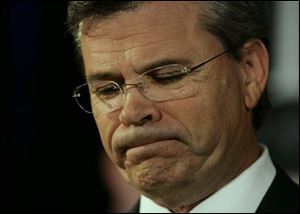
Ky. governor loses bid for 2nd term; Miss. governor re-elected
11/6/2007
Republican Gov. Ernie Fletcher pauses as he delivers his concession speech after losing the Kentucky gubernatorial race to Democrat Steve Beshear.
Kentucky Gov. Ernie Fletcher, a Republican whose lone term was dogged by a hiring scandal, lost badly Tuesday despite an election-eve effort to woo conservative voters by displaying the Ten Commandments in the state Capitol.
In Mississippi, Gov. Haley Barbour has won a second term, defeating Democratic challenger John Arthur Eaves Jr. Barbour, practically the only politician to come out of Hurricane Katrina looking good, was heavily favored to win re-election after campaigning on his successful management of the recovery.
Democratic challenger Steve Beshear, a former attorney general and lieutenant governor, cruised to victory in Kentucky after a campaign in which he repeatedly reminded voters of accusations that Fletcher directed the hiring of political allies for jobs protected by the state s merit system.
With 71 percent of precincts reporting, Beshear had 431,566 votes, or 60 percent, to Fletcher s 285,297 votes, or 40 percent.
Beshear, who pulled off a political comeback 20 years after last holding office, also made religion a centerpiece of his campaign, citing his religious upbringing and running television ads showing him in front of a church in western Kentucky.
Fletcher on Monday sought last-minute support by ordering that the Ten Commandments be displayed alongside other historical documents in the state Capitol, after a federal judge ruled that a previous injunction in a separate court case did not apply to the display.
Fletcher, the state s first GOP governor in more than 30 years, was indicted on misdemeanor charges that were later dismissed in a negotiated deal after a judge said he could not be tried in office. But the grand jury later issued its findings, saying Fletcher had approved a widespread and coordinated plan to skirt state hiring laws.
In Mississippi, Barbour s campaign capitalized on his successful management of the hurricane recovery, stressing job growth and rebuilding along the Gulf Coast.
Barbour and his Democratic opponent, trial lawyer John Arthur Eaves Jr., quoted Scripture as they exchanged barbs.
With 10 percent of the Mississippi vote counted, Barbour had 23,629 votes, or 59 percent, to Eaves 16,289 votes, or 41 percent.
As is common in elections in odd-numbered years, the slim lineup of races was expected to keep turnout low.
Voters also were set to choose mayors in Columbus, San Francisco, Houston, Baltimore, Philadelphia and Pittsburgh.
No serious challenger threatened San Francisco Mayor Gavin Newsom s bid for a second term, even though the mayor admitted just eight months ago that he had a drinking problem and an affair with a close aide s wife.
In Philadelphia, former Democratic councilman Michael Nutter became the city s next mayor on his promises to reduce gun violence, crack down on no-bid contracts and offer $10,000 tax breaks to companies that hire convicts. But first Nutter wants to declare a citywide litter cleanup and rid the City of Brotherly Love of its less-flattering nickname: Filthadelphia.
In the lone congressional race, voters in northwest Ohio were choosing among five Republicans and two Democrats in a primary for the nomination to succeed Rep. Paul Gillmor, who died in September from a fall at his Washington apartment. The general election will be Dec. 11.
Several states were voting on ballot measures, including a Utah proposal that would create the nation s first statewide school voucher program open to all, even affluent families in well-performing districts.
Oregon voters considered a measure to raise the cigarette tax by 84.5 cents a pack to $2.02 to fund health insurance for about 100,000 children now lacking coverage. Tobacco companies spent nearly $12 million fighting it.
New Jersey voters were deciding a referendum authorizing the state to borrow $450 million over 10 years to finance stem cell research.
Read more in later editions of The Blade and toledoblade.com